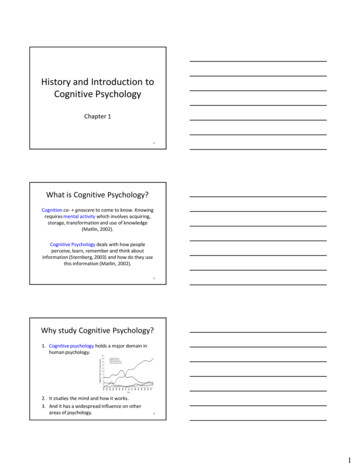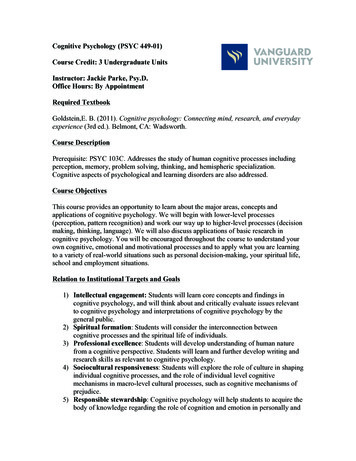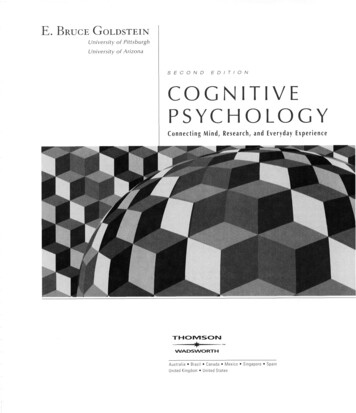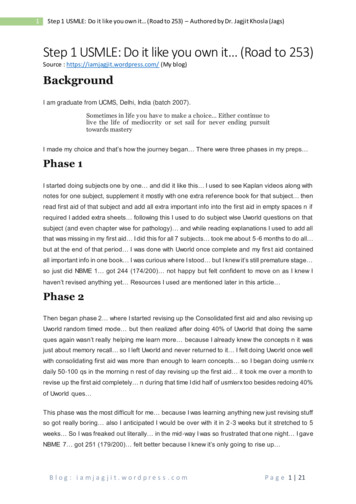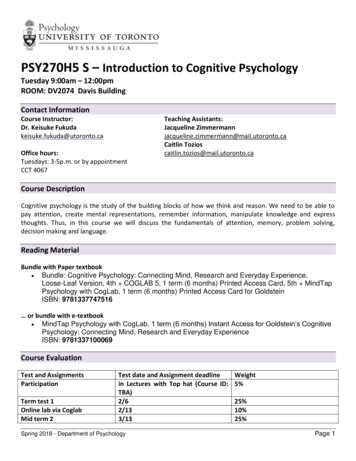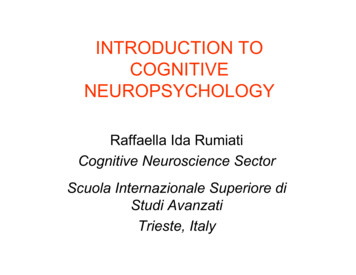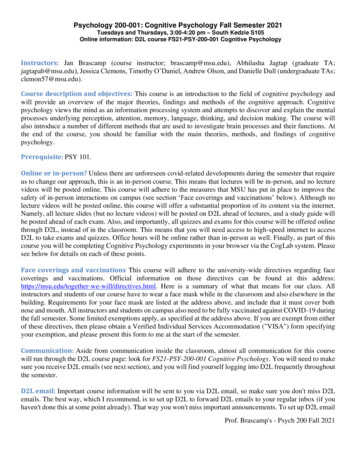
Transcription
Psychology 200-001: Cognitive Psychology Fall Semester 2021Tuesdays and Thursdays, 3:00-4:20 pm – South Kedzie S105Online information: D2L course FS21-PSY-200-001 Cognitive PsychologyInstructors: Jan Brascamp (course instructor; brascamp@msu.edu), Abhilasha Jagtap (graduate TA;jagtapab@msu.edu), Jessica Clemons, Timothy O’Daniel, Andrew Olson, and Danielle Dull (undergraduate TAs;clemon57@msu.edu).Course description and objectives: This course is an introduction to the field of cognitive psychology andwill provide an overview of the major theories, findings and methods of the cognitive approach. Cognitivepsychology views the mind as an information processing system and attempts to discover and explain the mentalprocesses underlying perception, attention, memory, language, thinking, and decision making. The course willalso introduce a number of different methods that are used to investigate brain processes and their functions. Atthe end of the course, you should be familiar with the main theories, methods, and findings of cognitivepsychology.Prerequisite: PSY 101.Online or in-person? Unless there are unforeseen covid-related developments during the semester that requireus to change our approach, this is an in-person course. This means that lectures will be in-person, and no lecturevideos will be posted online. This course will adhere to the measures that MSU has put in place to improve thesafety of in-person interactions on campus (see section ‘Face coverings and vaccinations’ below). Although nolecture videos will be posted online, this course will offer a substantial proportion of its content via the internet.Namely, all lecture slides (but no lecture videos) will be posted on D2L ahead of lectures, and a study guide willbe posted ahead of each exam. Also, and importantly, all quizzes and exams for this course will be offered onlinethrough D2L, instead of in the classroom. This means that you will need access to high-speed internet to accessD2L to take exams and quizzes. Office hours will be online rather than in-person as well. Finally, as part of thiscourse you will be completing Cognitive Psychology experiments in your browser via the CogLab system. Pleasesee below for details on each of these points.Face coverings and vaccinations This course will adhere to the university-wide directives regarding facecoverings and vaccinations. Official information on those directives can be found at this s.html. Here is a summary of what that means for our class. Allinstructors and students of our course have to wear a face mask while in the classroom and also elsewhere in thebuilding. Requirements for your face mask are listed at the address above, and include that it must cover bothnose and mouth. All instructors and students on campus also need to be fully vaccinated against COVID-19 duringthe fall semester. Some limited exemptions apply, as specified at the address above. If you are exempt from eitherof these directives, then please obtain a Verified Individual Services Accommodation ("VISA") form specifyingyour exemption, and please present this form to me at the start of the semester.Communication: Aside from communication inside the classroom, almost all communication for this coursewill run through the D2L course page: look for FS21-PSY-200-001 Cognitive Psychology. You will need to makesure you receive D2L emails (see next section), and you will find yourself logging into D2L frequently throughoutthe semester.D2L email: Important course information will be sent to you via D2L email, so make sure you don't miss D2Lemails. The best way, which I recommend, is to set up D2L to forward D2L emails to your regular inbox (if youhaven't done this at some point already). That way you won't miss important announcements. To set up D2L emailProf. Brascamp's - Psych 200 Fall 2021
forwarding please log onto D2L and navigate to Help MSU Documentation D2L Tools and Tips at MSU D2L Email Forwarding. You can also view your D2L emails in the D2L interface itself rather than in your normalinbox. To do this please navigate to the email interface in D2L, and make sure the 'Filter By:' field is set to 'AllMessages'. Without that filter setting important emails may not show. Did I mention that important informationfor this course will be sent to you via D2L email?Getting help, and online office hours: For questions that have a short answer, you can come talk to us afterclass or send an email to the course instructor (brascamp@msu.edu). But: we do not manage the Sona system sofor questions about Sona please see the next section. For questions that require more interaction, please visit oneof the office hours listed in the table below. The office hours will be offered online rather than in-person. If youplan to visit one of the office hours, please email the email address listed for that time/day and specify what youwould like to talk about. You will receive a zoom link to attend the office hour.Time and dayInstructor in attendanceAddress to send email to for zoomlinkFriday, noon-1 pmJan Brascampbrascamp@msu.eduTuesday, noon-1 pmOne of the undergraduate TAsclemon57@msu.eduQuestions about Sona: The Sona system is a department-wide system, and the instructors of this particularcourse don't know all of its details. So for all questions about research participation / the Sona system, pleasecontact the Research Participation Coordinator: Ms. Audra Jeffrey. Her email address is jeffre22@msu.edu.Recommended text and assigned reading: The recommended text is Cognitive Psychology: ConnectingMind, Research, and Everyday Experience, 4th Edition by E. Bruce Goldstein. 5th edition is also allowed, but thechapter numbering in the Course schedule below follows the order of edition 4. The text is not required. Thecourse schedule below lists recommended reading for each lecture. If you decide to read along, then it is a goodidea to keep up with reading at the pace indicated in the course schedule, because the recommended reading willmatch the material of the associated lectures.Attendance: There will be no attendance credit for this course. Still, it is a good idea to attend the lecturesbecause I will present material in a different way than the textbook and I will present material that is not coveredby the textbook. Everything that is discussed in lectures may be part of an exam, whereas material from thetextbook that did not feature in lectures will not be part of the exam.CogLab: You need to have access to the CogLab 5 Online Laboratory. This is an online tool that allows you toget hands-on experience with experiments from cognitive psychology at your own computer. For details on howCogLab works, please see the section labeled 'Quizzes' below. If you bought your text from the bookstore, youraccess code may have been bundled with the text. If you did not get an access code bundled with your text, youmust purchase it separately. You have two options.1. Go to the following link. 3 (a credit card is required)2. The bookstore may order some standalone copies of the CogLab access codeOnce you have an access code (from a bundled copy or bought as a standalone) you will need to create youronline CogLab account. Please go to D2L and access the document CogLab instructions under Practical mattersfor detailed instructions on how to do so.Exams: There will be three multiple choice exams: two midterms and a non-cumulative final exam. Each examwill consist of 52 multiple choice questions about material that has been discussed in lectures (since the previousexam). Each exam counts for 26% of your final grade, except for your best exam: that one counts for 30%.Everything that is discussed in lectures and/or shown on the lecture slides may be part of an exam. Material fromthe textbook that did not feature in lectures will not be part of the exam. Exams will be offered on D2L, and youProf. Brascamp's - Psych 200 Fall 2021
will take them at your computer. This means that you will need access to high-speed internet to access D2L totake the exams. At the exam time and date listed in the course schedule below, go onto D2L, open the'Assessments' dropdown menu and select 'Quizzes'. There you will see the relevant exam listed. More detailsabout how to take the exams will be provided ahead of the exam dates. You are required to complete all examson your own and without reference material.Coglab quizzes: This course has three short multiple choice quizzes. Each quiz counts for 5% of your finalgrade. Each quiz will consist of 10 multiple choice questions about CogLab (please see the section named CogLabto learn what that is). This is how that works: in the course schedule below I have assigned 15 CogLab experimentsthat are applicable to different course topics. These experiments will familiarize you with behavioral methods thatare used to investigate human cognition, and completing them will help you better understand the lectures. Youare expected to participate in the assigned CogLab experiments around the time that they are assigned, but yourparticipation in the experiments themselves will not be evaluated directly. Instead, during each of the three quizzesyou will be tested on your knowledge of the 5 CogLab experiments that were assigned prior to that quiz, and thisknowledge will depend on you having completed those experiments. Beware: the order of the 15 assigned CogLabexperiments in the course schedule does not follow the numbering in the online CogLab system, so please payattention. Like the exams, the quizzes will be offered on D2L, and you will take them at your computer. Thismeans that you will need access to high-speed internet to access D2L to take the quizzes. At the exam time anddate listed in the course schedule below, go onto D2L, open the 'Assessments' dropdown menu and select'Quizzes'. There you will see the relevant quiz listed. More details about how to take the quizzes will be providedahead of the quiz dates. You are required to complete all exams on your own and without reference material.Exam and quiz times, and requesting alternatives: The times and dates for exams and quizzes are listed inthe table labeled ‘Test Schedule’ below. If you have a good reason why you cannot take an exam or quiz at theassigned time, please send an email to the graduate TA, Abhilasha Jagtap, identifying the issue. The email addressis jagtapab@msu.edu. For valid requests that come in before the exam/quiz time, we can reschedule the day and/ortime for you. Please be sure to review your availability right now: if you miss an exam or quiz and contact theTA after the assigned time has already passed, then there is little we can do to help.Technical difficulties during exam or quiz: If during a test you experience technical difficulties, then pleaseemail the graduate TA, Abhilasha Jagtap, to explain the issue. The email address is jagtapab@msu.edu. She willwork with you to resolve it.Subject Pool Participation (HPR/Sona): 3% of your total grade for this course comes from participation inthe subject pool, which is coordinated through the Psychology department’s Sona system. This is equivalent to 3hours of research participation. You may also complete more than 3 hours if you are interested in extra credit (seesection 'Extra credit' below). This semester will include a mixture of in-person and online experiments from whichyou can choose. Please make sure you participate before the final deadline for Sona participation: Friday,December 10. Details for how to create your Sona account are available in the document Class SONAInstructions FS2021.pdf in the folder Practical matters on D2L. For all questions about research participation,please contact the Research Participation Coordinator (Ms. Audra Jeffrey; jeffre22@msu.edu). Here are twofurther pointers. First, be careful because some experiments posted on Sona compensate with money, not coursecredit. Second, be sure to sign up for the Psychology department's Sona system; some other departments havetheir own Sona system but participation in those systems doesn't count for Psychology courses.Subject Pool Participation (HPR/Sona) alternative assignment: If you are under 18 years old andtherefore cannot participate in research, you can perform an alternative assignment. Information on this alternativeassignment can be found in the document Class SONA Instructions FS2021.pdf in the folder Practical matterson D2L, and for further details please contact the Research Participation Coordinator (Ms. Audra Jeffrey;Prof. Brascamp's - Psych 200 Fall 2021
jeffre22@msu.edu). If you do not wish to participate in research for any other reason but would still like to getthe points, then you can perform the following alternative assignment. Select 15 of the CogLab experiments thatare not among the 15 assigned for the course (i.e. not in the schedule below), complete these experiments, andanswer all the associated questions in the CogLab student manual (log into CogLab and choose 'View studentmanual'). Your answers must be typed out and emailed to me no later than the final deadline for Sona participation:Friday, December 10, and points will be assigned in proportion to the experiments/questions completed (up to3% of your grade). If there is evidence that your answers are partially or completely plagiarized/copied fromanother source (a different student, etc.), then points will be subtracted and you will be reported to the appropriateauthorities (see m-policy.html).Extra credit: This course has a total of 2% of extra course credit that you can earn. You can earn these 2% ofextra credit in one of two ways, but you can select only one of the two (not both). These are the ways:1. You may complete 2 more hours of HPR/Sona experiments, in addition to any points you completed as part ofthe course’s HPR/Sona requirement. This will earn you 2% of extra credit. The same deadline applies as for thestandard HPR/Sona experiments (see above).2. You may complete the HPR/Sona alternative assignment listed above, which consists of performing additionalCogLab experiments and answering the associated questions. Extra credits will be awarded in proportion to thenumber of CogLab experiments completed in this way, up to 2% of course credit for 10 completed experiments.Note: if you already performed the HPR/Sona alternative assignment and would like to make use of this secondextra credit option, then you need to select different CogLab experiments for the extra credit option (i.e. ones thatare neither among the 15 in the schedule below, nor among the ones you selected as an HRP/Sona alternative).The same deadline applies as for the standard HPR/Sona alternative, and the same plagiarism rules apply (seeabove).Accommodations for Students with Disabilities: Michigan State University is committed to providing equalopportunity for participation in all programs, services and activities. Requests for accommodations by personswith disabilities may be made by contacting the Resource Center for Persons with Disabilities at 517-884-RCPDor on the web at http://rcpd.msu.edu. Once your eligibility for an accommodation has been determined, you willbe issued a Verified Individual Services Accommodation ("VISA") form. Please present this form to me at thestart of the term and/or two weeks prior to the accommodation date (exam, quiz, etc.). Requests received afterthis date may not be honored. If you require testing accommodations (additional time, etc.) please contact me andsend your VISA well ahead of the date of the test.Prof. Brascamp's - Psych 200 Fall 2021
Final Grade Breakdown# pointsBest Exam60*Other Exam 52Other Exam 52Quiz 110Quiz 210Quiz 310Subject Pool 6Course total 200 points% of final grade30.0%*26.0%26.0%5.0%5.0%5.0%3.0%100%*Each exam has 52 questions. In calculating youroverall grade, you can treat your best exam as if itcontained 60 questions, while keeping yourproportion of correct questions on that exam thesame as it was in reality (e.g. 26 out of 52 becomes30 out of 60).Final GradeotherwiseScale,90½ % and above86½ % and above80½ % and above76½ % and above70½ % and above66½ % and above60½ % and aboveLess than 60½ %unlessannounced4.03.53.02.52.01.51.00.0Course schedule: This schedule is tentative. I reserve the right to change it to best suit the course.DateLecturesRecommendedRecommended Tests this week (seebook chapterCogLabTest schedule for exactaccompanyingexperiments to day and time)lecturesdo this week9/2/211. Introduction to the courseCh 1-Signaldetection9/7/212. History of cognitive psychology 1Ch 2-Simple9/9/213. History of cognitive psychology 2detection-Sternbergsearch9/14/214. Cognitive neuroscience 1Ch 2-Müller-Lyer9/16/215. Cognitive neuroscience 2illusion-Visual search9/21/216. Cognitive neuroscience 3 Methods 1Quiz 1: first five9/23/217. Methods 2CogLab experiments.9/28/218. Review for Midterm 1Midterm 1: all lectures9/30/21(Midterm exam 1)Ch 3-Blind spottill this point.10/5/219. Perception 1Ch 3-Apparent10/7/2110. Perception 2motion-Changedetection10/12/21 11. Perception 3Ch 4-Spatial cueing10/14/21 12. Perception 4 Attention 1-Stroop effect10/19/21 13. Attention 2Ch 5 and 6Quiz 2: next five10/21/21 14. Attention 3 Memory 1CogLab experiments.10/26/21 (Break day)Ch 7 and 8-Partial report10/28/21 15. Memory 2-Memory span11/2/2116. Memory 3-Encoding11/4/2117. Review for Midterm 2specificityProf. Brascamp's - Psych 200 Fall 2021
30/2112/2/2112/7/2112/9/2112/15/21(Midterm exam 2)18. Conceptual knowledge Imagery 119. Imagery 220. Language 121. Language 2(Thanksgiving)22. Language 3 Problem solving 123. Problem solving 224. Judgment, decisions and reasoning25. Review for Final exam(Final exam)Ch 9Ch 10Ch 10 and 11-Serial position-PrototypesMidterm 2: all lecturessince previous exam.Quiz 3: final fiveCogLab experiments.Ch 11Ch 12Ch 13Non-cumulative finalexam: all lecturessince previous exam.Test schedule: Although lectures for this course are in-person, all tests will be administered online, throughD2L. Please note: for all tests there is a certain time window during which the test can be started on D2L. Thiswindow is listed below under 'Starting time window'. Once started, the clock starts ticking toward the time limit,which is listed under 'Test duration'. For information on rescheduling a test, please see the section above that istitled ‘Exam and quiz times, and requesting /9/202111/16/202112/15/2021Starting time window0:01 am-11:59 pm3:00-4:20 pm0:01 am-11:59 pm3:00-4:20 pm0:01 am-11:59 pm10:00 am-noonTest duration20 minutes80 minutes20 minutes80 minutes20 minutes80 minutesTestQuiz 1Midterm exam 1Quiz 2Midterm exam 2Quiz 3Final examDistributing lectures: Students are expected to respect the intellectual property of course instructors. All coursematerials presented to students are the copyrighted property of the course instructor and are subject to thefollowing conditions of use:1. Students may not post the recordings or other course materials online or distribute them to anyone not enrolledin the class without the advance written permission of the course instructor and, if applicable, any students whosevoice or image is included in the recordings.2. Any student violating the conditions described above may face academic disciplinary sanctions.Academic Honesty: Article 2.III.B.2 of the Student Rights and Responsibilites (SRR) states that "The studentshares with the faculty the responsibility for maintaining the integrity of scholarship, grades, and professionalstandards." In addition, the (insert name of unit offering course) adheres to the policies on academic honesty asspecified in General Student Regulations 1.0, Protection of Scholarship and Grades; the all-University Policy onIntegrity of Scholarship and Grades; and Ordinance 17.00, Examinations. (See Spartan Life: Student Handbookand Resource Guide and/or the MSU Web site: www.msu.edu.)Therefore, unless authorized by your instructor, you are expected to complete all course assignments, includinghomework, lab work, quizzes, tests and exams, without assistance from any source. You are expected to developoriginal work for this course; therefore, you may not submit course work you completed for another course tosatisfy the requirements for this course. Also, you are not authorized to use the www.allmsu.com Web site tocomplete any course work in this course. Students who violate MSU academic integrity rules may receive apenalty grade, including a failing grade on the assignment or in the course. Contact your instructor if you areunsure about the appropriateness of your course work. (See also the Academic Integrity webpage.)Prof. Brascamp's - Psych 200 Fall 2021
Sep 02, 2021 · Recommended text and assigned reading: The recommended text is Cognitive Psychology: Connecting Mind, Research, and Everyday Experience, 4th Edition by E. Bruce Goldstein. 5th edition is also allowed, but the chapter numbering in the Course schedule below
